Introduction
So, you need services from one of the top penetration testing companies in the UK? Choosing the right penetration testing company is more crucial than ever. Explore the best pen testing companies the UK offers, ensuring your cyber security needs are expertly met. Why does choosing a penetration testing company matter? We’ll delve deep into what penetration testing involves, its types, and a carefully curated list of the top providers which can help you decide what vendors to contact. Before we dive deep into the land of penetration testing, we should first clear up some concepts surrounding what penetration testing is and the technical jargon.
We have also produced a Penetration Testing Buyer’s Guide, which details some of the information in this blog and provides vital information on what elements are considered when scoping a penetration test.
So, what exactly is Penetration Testing?
Penetration testing, or pen testing, is a crucial process in identifying and strengthening vulnerabilities in a system. It involves simulating cyber attacks in a controlled environment to evaluate the security of a system. This section will explore various security testing services, including offerings you will likely see when researching penetration testing companies. Some companies may specialise in specific areas, while others may not offer the services listed below. It’s essential to examine the pen testing company (We have done that for you, though) before agreeing to purchase their services.
- Web Application Penetration Testing: Tests web applications for vulnerabilities, including SQL Injection, Cross-Site Scripting (XSS), and other common web-based attacks, an essential aspect of website security.
- API Penetration Testing: This test evaluates the security of application programming interfaces (APIs), which is essential for seamless, secure app interactions and helps mitigate threats like API Key Leakage and IDOR vulnerabilities.
- Network Penetration Testing evaluates the security of your network infrastructure, which is crucial in safeguarding your assets against IP Spoofing, Man-in-the-Middle Attacks, and other network-based threats.
- Cloud penetration testing assesses the security of cloud-based services, ensuring protection against vulnerabilities such as misconfigured storage buckets and unsecured APIs, a must in our increasingly cloud-reliant world.
- GDPR Penetration Testing: Ensures compliance with GDPR, protecting data privacy and integrity.
- Mobile Application Penetration Testing: Focuses on securing mobile apps against a growing range of mobile-specific threats.
There is also Social Engineering Penetration Testing…however, we probably don’t need to discuss what happens during those engagements.

Why does choosing the right penetration testing company matter?
Choosing the right penetration testing provider isn’t just ticking off a compliance checklist; it’s about securing your digital assets from would-be attackers. And let me tell you, the hackers aren’t slowing down for a tea break.
Let me tell you a story.
Consider a company we shall refer to as OopsTech. They decided to save money by hiring a low-budget penetration testing company, CheapTestersRUs. This company barely addressed security from more than a surface-level perspective; they looked out for only the most apparently apparent vulnerabilities and ignored deeper critical issues.

The result was a severe cyber-attack on OopsTech’s network. Sensitive client information was compromised and found its way onto dark web forums. There were severe PR challenges, legal complications, and a considerable loss of customer trust.
This fictional case reminds us of the importance of choosing the right penetration testing company. It’s not just about identifying vulnerabilities in a system but about partnering with experts who can navigate the complex cyber threat landscape. You need a team that doesn’t just point out problems but offers effective, real-world solutions to safeguard your organisation.
Top things to look for in a Pen Testing Companies UK
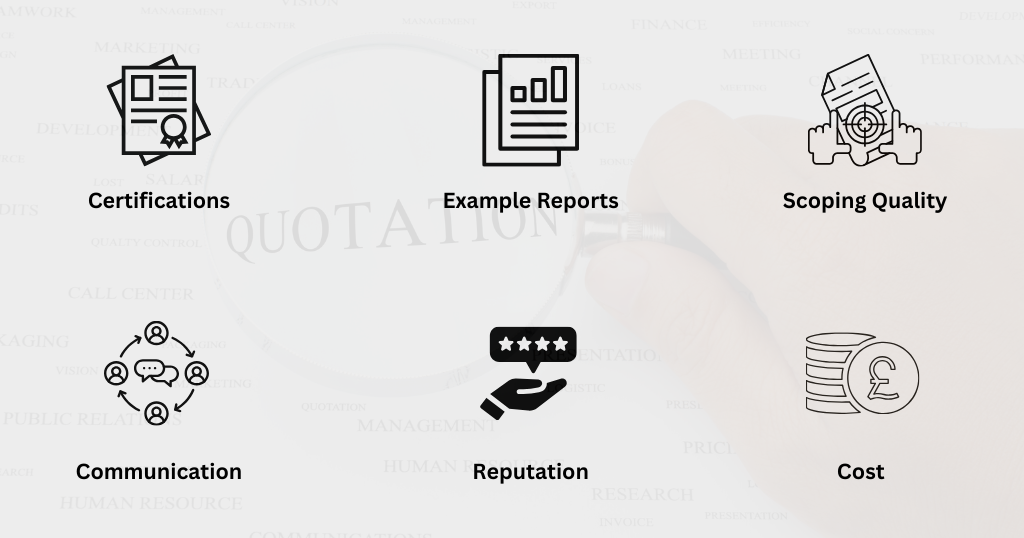
When selecting a penetration testing company, it’s crucial to consider various factors to ensure you receive comprehensive and effective cyber security services. Here are the top elements to consider when choosing among the leading pentest companies UK offers:
Why You Should Choose a CREST-Accredited Penetration Testing Provider
When selecting a penetration testing company, not all providers are created equal. So, how do you ensure you’re working with a provider that meets the highest industry standards?
✅ Choose a CREST-accredited penetration testing company.
A CREST accreditation means that the company has been independently assessed for technical competence, ethical conduct, and professional service delivery. CREST-Accreditation ensures that:
- Consultants are likely to be highly trained & certified (e.g. CRT, CCT INF, CCT APP, OSCP). ✔️
- Testing methodologies follow best practices (PTES, OWASP, NIST). ✔️
- Reports meet industry compliance and security standards ✔️
- The company’s information security and quality standard policies align with ISO 27001 and ISO 9001, respectively. ✔️
- Legal and ethical hacking principles are upheld ✔️
If you want more information on CREST. We wrote a great guide which explains everything you need to know. You can find that guide here.
What could happen if you don’t choose an accredited provider?
Unfortunately, some unaccredited penetration testing companies cut corners:
- Inexperienced testers may miss critical vulnerabilities
- Reports can lack depth, making remediation harder ❌
- Findings may not align with compliance requirements ❌
- Third parties may not accept a penetration test report that an unaccredited company delivered ❌
- Poor scoping can lead to incomplete or irrelevant tests ❌
Before signing any contract, ask:
- Is the company CREST-accredited?
- Can they provide an example report?
- Do they offer tailored testing based on risk?
Expertise and Qualifications of the Consultants
Look for a pen testing company with a team of certified professionals with credentials such as CREST [CRT, CCT INF, CCT APP], OSCP, or CISSP. These certifications indicate high expertise and a commitment to cyber security. Not all penetration testing companies will have the same level of knowledge, so it’s essential to understand this from the outset.
It’s essential to look at not only the company itself but also the consultants who will be conducting the assessment. If the company is CREST accredited, that does not guarantee that the consultant will be. Consider being more granular with your requests and try to ensure that a qualified consultant will conduct the assessment. The quality of the assessment primarily comes from the quality of the consultant. As the service buyer, it’s essential to ask the right questions and ensure that the service you receive is top quality.
Get an example report from the pen testing company
Ask for an example of their penetration test report. Why? Because the report is where the actual value of a pen test lies. That’s what you pay for; that is usually the final deliverable for most penetration test services. A good report doesn’t just highlight the issues – it explains them clearly, shows the potential risks, and provides practical steps to fix them. The final deliverable is unknown if the penetration testing company can’t give you an example report. The provider should be able to help you understand what to expect from their service.
Here’s what to look for when looking for a pen testing provider:
- Overviews: Is the overview adequately described? Are the test results appropriately summarised for a non-technical audience?
- Clarity: Does it make sense to someone who isn’t super technical?
- Depth: Is it detailed enough to be helpful, or just surface-level findings?
- Remediation Quality: Does it include recommendations your team can implement? Are the recommendations customised to the tested environment?
- Junk: Does it include many low-hanging fruit findings that are poorly explained?
- Impact: Are the findings adequately explained and catered to the environment?
Customised testing approaches of the company
Choose a penetration testing company that offers tailored penetration testing services. Every organisation has unique security needs, and a one-size-fits-all approach will not be practical. The provider should be able to customise its testing methods based on your specific infrastructure and security concerns.
Scoping quality and thoroughness
The pen testing company should adequately scope every assessment. Scoping should be thorough and complete, considering all the assets within the scope and the numerous variables that come into play when scoping an evaluation. A company that has not had a penetration test before might not know what to look out for; however, to give you some insight. The pen testing company should ask several questions about each test type required for the testing:
- How vast are the assets?
- Is the pen testing company reviewing a single web application? Or an entire corporate environment. The more assets under review, the more costs associated with the assessment.
- How many user roles are within the scope?
- Is the test being conducted for compliance reasons? (Such as PCI DSS, ISO 27001, DTAC)
- Will the test be conducted from a black, grey or white box perspective?
- The test perspective can affect the price, depending on the vendor. If the penetration testing company does not know the environment under review, it must enumerate and footprint the assets. This can increase the project’s overall costs due to the time required to undertake this task.
- Is the test to be conducted from an authenticated perspective or an unauthenticated one?
- What environment is to be tested? (Production, QA, Development)
- How sensitive are the lead times?
- Do you need the testing in two weeks? While a vendor might be a great fit, they may be fully booked for a few weeks, possibly months. It is always best to check with the vendor to ensure that their lead times align with your requirements.
- Is retesting part of the scope? Is the retesting free, or is this a charged service?
- If you have received a project proposal from a penetration testing company, look out for specific references to retesting. If the proposal does not mention it, you will likely be charged for the luxury later down the line. If in doubt, ask!
If these questions are not asked at the scoping stage, the project’s total price may not accurately reflect the environment. Speaking to a Senior Penetration Tester when scoping an environment is always best. A senior will be able to parse out the finer details and ask the essential questions; experience will often save time and money when scoping the assessment.
Communication with the company
A good penetration testing company should keep the client updated throughout the assessment, providing updates on when the testing is being conducted and hiccups which will almost certainly occur. Good communication should include daily updates and quick triaging of high/critical risk vulnerabilities, especially concerning production environments. Bad communication during the penetration test will often lead to a poorer outcome for the assessment. The testing team must keep in communication with the client, which can be via email, a custom Slack channel, or any other seamless means that has been negotiated. The project lead for both sides must agree to a communication strategy.
A good provider should ensure the following:
- The company should ensure that the test is planned correctly and that the tester has all the information required to conduct the assessment.
- Before the test starts, there should be enough time to iron out any access issues or concerns.
- The consultant should inform the client when the testing starts and finishes.
- The consultant should use their best judgment when triaging vulnerabilities with the client. If the consultant considers an issue high-risk and easily exploitable, the consultant should triage the vulnerability with the client.
- The consultant should ask questions during the assessment if they are unsure about something, such as an unclear web application function.
- The consultant should inform the client if they suspect something may have gone wrong, such as an asset suddenly appearing offline or a web application function that seems to have broken during testing.
- The company should inform the client if they suspect the assessment has been under or over-scoped. Scoping a penetration test is not an exact science, and sometimes the scoping may not be 100% accurate.
Comprehensive reporting and support
A quality penetration testing company should provide detailed reports that identify vulnerabilities and offer clear, actionable recommendations for remediation. Look for any added value to the company’s reports, such as Indicators of compromise. Additionally, check if they offer post-testing support to help address any security issues and improve defences. Some penetration testing companies (such as us) offer free retesting after they have conducted the assessment, although this is not common in the industry.
Reputation and experience
Research the company’s reputation in the market. Look for reviews, case studies, or testimonials from previous clients. Experience in handling a variety of security scenarios and a track record of successful engagements are good indicators of a reliable company. Speak to a security professional handling the assessment before signing any project proposal. Ask for an example penetration test report if required. Most companies will be able to provide you with a sample report that will closely reflect the reporting standards; after all, this is the final deliverable for most penetration testing services.
Ethical and Legal Compliance
Ensure that the provider adheres to ethical hacking guidelines and complies with all relevant legal and regulatory standards. This includes respecting data privacy laws and having proper contracts and non-disclosure agreements in place to protect your sensitive information.
Cost
It is essential to factor in the costs when assessing a penetration testing company in the UK. The final price can vary depending on the size and scale of the company. The costs can range from £900 to £1700 a day. If you want a deep dive into penetration test pricing, we wrote a fantastic guide you will almost certainly want to read.
List of Top 5 Pen Testing Companies UK
- Sencode
- Aptive
- Sentrium
- Nettitude
- Cyber Tec Security
Fear not! We’ve done the heavy lifting for you. This section introduces the crème de la crème of the UK’s penetration testing landscape. From renowned industry leaders to innovative up-and-comers, each penetration testing company on our list brings a unique blend of professionalism, expertise, and bespoke support.
Sencode
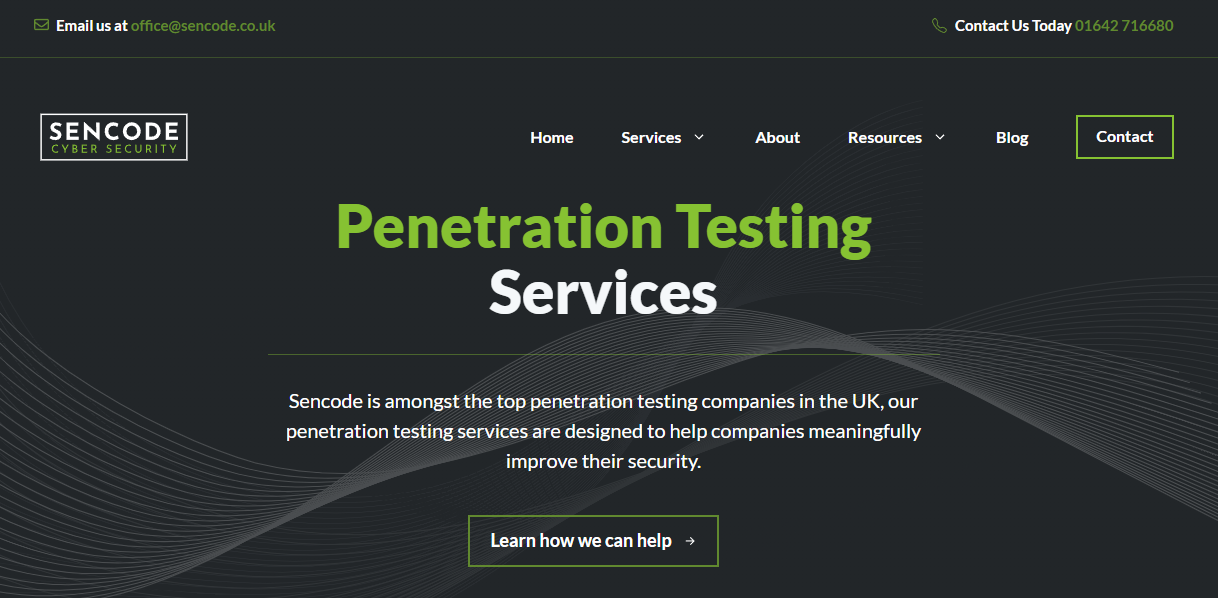
Overview: Yes. Of course, we are first, but we genuinely believe in that. We offer a range of penetration testing services. We focus on Penetration Testing (CREST-accredited), Cloud Configuration reviews and bespoke Red Team Assessments. If there is a vulnerability we can exploit, we will find it.
CREST Accredited Penetration Testing – ✅
Services Offered:
- Penetration Testing (API, Web, Cloud, GDPR, Mobile, Network)
- Cyber Security Assessments (Cloud Config reviews, OSINT Assessments, Red Team Assessments)
- Cyber Awareness Training
- Breaches Database
- Academy (Cyber Awareness Training Platform)
You can always contact us using the form below to find out. Safeguard your digital assets with our expert-led penetration testing services.
Contact us
Get a free, no obligation quote from one of our expert staff.
Sentrium
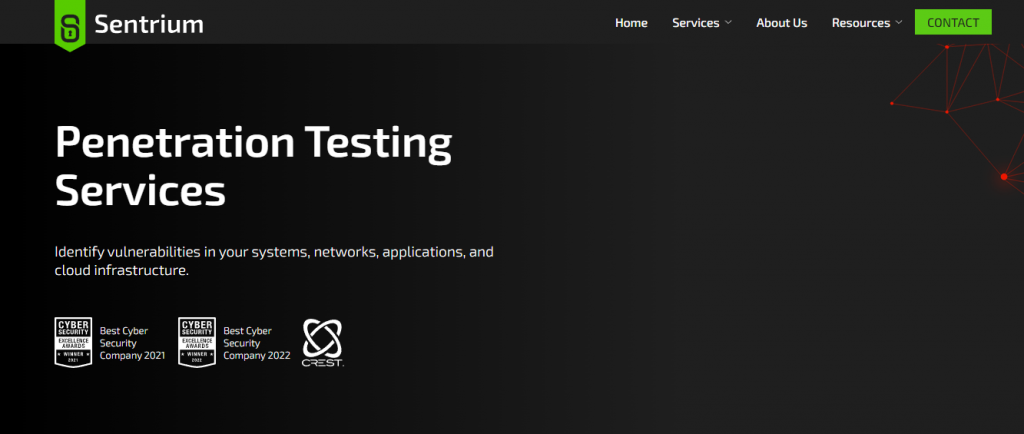
Overview: Sentrium is a CREST-approved Cheltenham-based cyber security company specialising in penetration testing services and source code analysis. It also offers cyber security advisory services for businesses seeking guidance on protecting themselves from cyber threats.
CREST Accredited Penetration Testing – ✅
Services Offered:
- Penetration testing
- Offers a comprehensive source code analysis review.
- Cyber security advisory services
Aptive
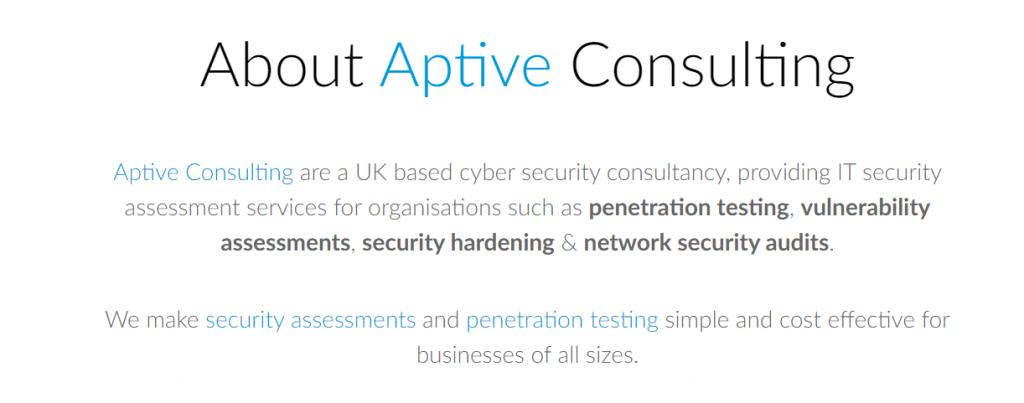
Overview: Based in Surrey Research Park, Guildford, Aptive offers affordable mobile and web application security testing services. Their consultants are CREST registered, so you know they are reliable. They also provide free retesting within 30 days of a penetration test and have fixed-price proposals. (Sencode offers retesting within 3 months).
CREST Accredited Penetration Testing – ❌
Services Offered:
- Vulnerability Assessment Services: Both manual and automated vulnerability assessments
- Penetration Testing.
- Security Hardening.
- Network Security Audits.
Nettitude

Overview: Nettitude is a global provider of cyber security services. Its offerings focus on technical assurance, consulting, managed detection, and response. Nettitude’s team is made up of CREST-certified penetration testers with extensive experience in security and software development.
CREST Accredited Penetration Testing – ✅
Services Offered:
- Security Testing.
- Penetration Testing.
- Risk and Compliance.
- SOC-as-a-Service.
- Cyber Security consulting services.
Cyber Tec Security

Overview: Founded in 2018, Cyber Tec Security is a Jersey-based IASME Certification Body focused on improving the security health of businesses across the UK, especially SMEs. Cyber Tec Security has over 30 years of experience in the industry and aims to assist businesses with obtaining their Cyber Essentials certification.
CREST Accredited Penetration Testing – ✅ (Delivered through partners)
Services Offered:
- Cyber Essentials Basic & Plus Certification: Offers a best price guarantee on certification packages and values authenticity over automation, providing personalised service with security specialists.
- Penetration Testing. (Delivered through partners)
- Vulnerability Assessment
- Cyber Insurance: Includes a 24/7 incident support response line in the case of a breach occurring
Conventional Penetration Testing vs Objective-Focused Penetration Testing
Before reaching out to a pen testing company, it is worth trying to understand better what outcome you want from the service. Typically, penetration tests are conventional (Offered by the vast majority of penetration testing companies), or they can be goal-orientated. Some pen testing companies may have minimal expertise in goal-orientated pen testing, so it’s worth asking the company if they can offer goal-focused testing before spending time and resources scoping the environment.
Conventional Penetration Testing
Conventional penetration testing focuses on uncovering numerous security weaknesses within a specified environment, offering a comprehensive view of the system’s ability to withstand different cyber threats. While it might not explore every issue the consultant identifies in detail, this extensive method can effectively highlight vulnerabilities across digital assets. This form of testing makes up the clear majority of penetration tests conducted.
Because the scope is designed to be comprehensive, conventional tests must balance depth with the overall breadth of coverage. Organisations often schedule these evaluations regularly (for instance, once or twice a year) to maintain an updated understanding of their security posture.
Consider a retail company with multiple branches and an e-commerce web application to provide an example of a conventional penetration test. The penetration testing company is tasked with assessing all of the company’s digital assets, including networks (Internal, External, and Wi-Fi), web applications, and APIs. The testing aims to identify as many potential weaknesses as possible, including outdated software, insecure input validation, cryptographic practices, etc. While a conventional penetration test casts a wide net, not every issue will have an extensive deep dive; however, catching a large volume means the company can address and prioritise the security issues.
Objective-Focused Penetration Testing
Objective-focused penetration testing—also known as goal-based or targeted testing—stands out by focusing on a specific objective, like retrieving sensitive information or breaching a business-critical service. Instead of trying to uncover every potential vulnerability, the tester’s work is directed towards a particular mission, simulating a real-world threat situation.
More narrowly defined, aiming at a particular system, dataset, or pathway within the target environment. This style of testing can be quicker than a broad assessment, since efforts are channelled towards a singular, high-priority goal.
To provide an example of goal-based testing, consider a financial services provider who wants to understand whether their payment processing system is vulnerable to attacks. While the company could conduct a conventional penetration test, it would prefer an objective test. The penetration testers then deploy a variety of attacks, such as social engineering and phishing, web application exploits, and network infrastructure attacks, to try to compromise the system.
Because the penetration test was goal-orientated on a narrow objective, the client gains vital insights regarding how an attacker might compromise their payment data.
Penetration Testing for Compliance: UK Requirements
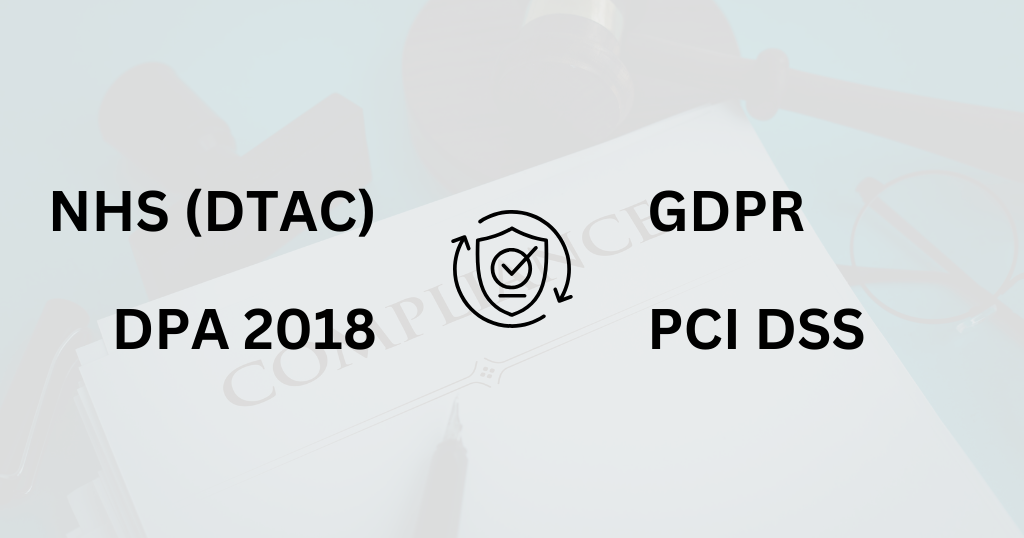
For companies operating in the UK, it’s essential to be aware of the various compliance requirements and regulations related to cyber security. Understanding this is essential to avoid potential fines and reputational damage. Below is a rundown of key regulations and compliance standards that may apply to your organisation, especially when considering penetration testing.
Data Protection Act 2018 (DPA 2018)
The DPA 2018 is the UK’s implementation of the General Data Protection Regulation (GDPR).
Why it matters to your company: If you process personal data, you must protect it against unauthorised access and minimise the risk of data breaches. Penetration testing can help identify vulnerabilities in your systems that could lead to data breaches, ensuring compliance with the DPA 2018.
General Data Protection Regulation (GDPR)
Although the UK has left the EU, GDPR principles are retained in UK law. GDPR sets out stringent data protection and privacy rules for EU and UK individuals.
Why it matters to your company: Non-compliance with GDPR can result in significant fines for your company. Regular penetration testing helps ensure sufficient data protection measures, reducing the risk of breaches and demonstrating compliance.
Digital Technology Assessment Criteria (DTAC)
DTAC is a framework used by the National Health Service (NHS) to assess the cyber security of digital health technologies.
Why it matters to your company: If you provide digital services or technologies to the NHS, you must meet DTAC standards. Penetration testing helps ensure your products are secure and compliant. For more information on DTAC, please read our blog.
Payment Card Industry Data Security Standard (PCI DSS)
PCI DSS sets security standards for companies that accept, process, store, or transmit credit card information.
Why it matters to your company: Compliance with PCI DSS is mandatory if your company handles payment card data. Penetration testing is required to identify and fix system vulnerabilities that handle cardholder data.
While more compliance regulations exist, the topic’s depth is not the focus of this blog post.
Conclusion
And there you have it, a comprehensive guide to navigating the intricate world of Pen Testing Companies UK. We’ve covered everything from understanding the multifaceted nature of pen testing to diving into the nuances of specific services like API, cloud, and GDPR testing. We’ve even shared a spooky tale of what can go wrong when you skimp on quality cyber security services, adding a sprinkle of humour to a serious subject.
The importance of selecting the right penetration testing provider cannot be overstated. This decision goes beyond compliance and safeguards your digital assets against increasingly sophisticated cyber threats. Remember, in cyber security, cutting corners can lead to dire consequences.
So, take your time, do your research, and choose a company that aligns with your specific cyber security needs. Remember, the right pen testing companies UK are not just service providers but your allies in the ongoing battle against cyber threats.
We hope this guide has been informative and perhaps even a bit entertaining. Don’t hesitate to seek further advice or discuss your cyber security needs.
Want to start a conversation about securing your assets? Contact us today for a free, no-obligation quote, and let’s talk cyber security. Remember, your digital security is our mission, and we’re here to help you navigate these complex waters with confidence and expertise.
This is a common question when looking for penetration testing services. The duration of a penetration test can often vary widely. The volume of the assets and complexity of the systems are usually the most significant factor in the length of the assessment. Generally, a pen test can take several days to several weeks. Other factors may also dictate the size of an evaluation, such as the requirements for on-site or off-site testing. Given the complexities of scoping, working closely with a penetration testing provider to scope the assessment professionally is essential.
The primary goal of any penetration test is to identify vulnerabilities in a digital asset before an attacker can exploit them. A penetration test involves a simulated cyber attack against the system under controlled conditions. This approach helps organisations correctly understand their security posture, improving their security. Some organisations also require penetration testing to adhere to specific standards and regulations.
When assessing the frequency of penetration testing, many factors should be considered. Common factors could include a change in infrastructure or code base, compliance requirements, or a previous security breach that requires thorough investigation. As a rule of thumb, penetration testing should be conducted annually. However, high-value organisations should update their frequency requirements based on the direct risk to the organisation. It is not uncommon for organisations with high-value intellectual property to be frequent targets of sophisticated attackers.
If something breaks during a penetration test, it’s crucial to have clear, proactive communication between the tester and your organisation to minimise disruption and risk; the consultant should immediately inform you of any suspected issue—such as an application function failing or an asset going offline—so that both parties can triage the problem, agree on next steps, and quickly restore normal operations, ensuring that even in unexpected situations your security assessments remain both rigorous and safe.
Yes. If you’re considering partnering with a company and have concerns about their security posture, it’s entirely appropriate to request that they undergo penetration testing. This is especially common for organisations dealing with sensitive information, highly regulated industries, or where supply-chain security is critical. Many companies proactively conduct penetration tests to reassure partners, clients, or stakeholders of their commitment to information security.
Penetration testing reports typically include a summary of findings, a detailed breakdown of vulnerabilities discovered, the severity of each issue, evidence of exploitability, and actionable remediation advice tailored to the tested environment. If in doubt, ask the company for an example report.